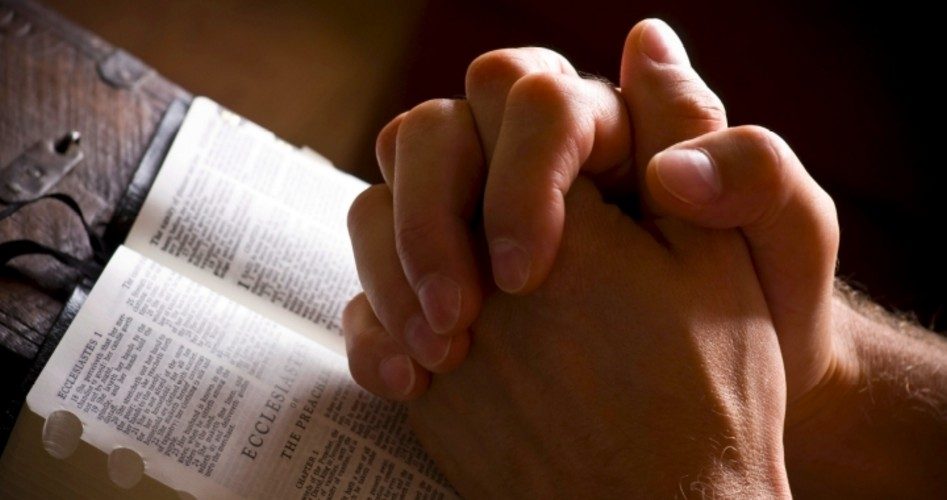
In a paper submitted to the Centre for Economic Policy Research (CEPR) University of Copenhagen associate professor Jeanet Sinding Bentzen reported on May 17, “In times of crisis, humans have a tendency to turn to religion for comfort and explanation. The 2020 COVID-19 pandemic is no exception.”
Using Google searches for the word “prayer,” she found that the crisis “has increased Google searches for ‘prayer’ to the highest level ever recorded. More than half the world’s population had prayed to end the coronavirus … the rise is due to an intensified demand for religion. We pray to cope with adversity.”
Tyndale House Publishers saw a similar increase. Sales of its Life Application Study Bible jump by 44 percent in March, while sales of its prose version of the Bible, Immerse Bible, lept 60 percent. And, according to Jim Jewell, an executive at Tyndale, “On [our Facebook page for the] New Living Translation, where we post Bible verses, engagement was triple what it was last March and up 72 percent from just last month.”
Use of Bible apps jumped as well. Christianity Today reported that readings of the popular app YouVersion (aka Bible.com or BibleApp) jumped 54 percent during this year’s Holy Week: from 26.4 million a year ago to 40.6 million.
Interest in the power of prayer was so great that the Wall Street Journal wrote an article about it, and then wrote a second article following readers’ overwhelming response to the first one. Journal writer Elizabeth Bernstein noted that prayer provably reduced anxiety and stress and resulted in a more positive outlook on life.
Her readers agreed. Doug from Edina, Minnesota, commented: “Each morning, as I’m driving into work, just as the sun is coming up, I’m in the habit of saying out loud, ‘Thanks be to God.’ These four simple words have a way of making a complex world simple and putting a smile on my face.”
Prescott, from Leesburg, Virginia, told Bernstein: “I am a combat veteran with sometimes severe PTSD. At the lowest point during my struggle with PTSD, after I had tried almost everything [else], I turned to prayer. The response was immediate and life changing.”
Jerry, from Brooklyn, said:
As a front-line medical professional, I would often pray under my mask and face shield. During a code blue, as I was praying, I didn’t realize I was praying loud enough for others to hear. The odd thing was that two of my colleagues actually asked me to pray louder so they could hear!
I kept reciting Psalm 23:4 [“Yea, though I walk through the valley of the shadow of death, I will fear no evil: for thou art with me; thy rod and thy staff they comfort me.”]. Everyone said it gave them a sense of calm and peace that was very much needed under the circumstances.
The science proving the power of prayer is impressive. Marilyn Schlitz, a lecturer on prayer who holds a Ph.D. from Harvard, says, “Prayer groups had statistically significant improvements in outcome, suggesting that the intervention [of prayer] has clinical relevance.”
Researchers at the Heritage Foundation said, “We have a logical reason why religion influences physical health through mental health, through enhancing social support, through influencing health behaviors, all affecting [positively] physical health outcomes.”
More than 100 medical schools now incorporate “patient spirituality” courses in their curricula, up from just 17 schools in 1995.
Among the verses used to bring comfort include Psalm 107:28-30:
Then they cried out to the Lord in their trouble,
and He brought them out of their distress.
29 He stilled the storm to a whisper;
the waves of the sea were hushed.
30 They were glad when it grew calm,
and He guided them to their desired haven.
Another is Philippians 4:6-7: “Do not be anxious about anything, but in every situation, by prayer and petition, with thanksgiving, present your requests to God. And the peace of God, which transcends all understanding, will guard your hearts and your minds in Christ Jesus.”
Although Martin Luther said the “the fewer the words, the better the prayer”, many rely on Psalm 91, which is 16 verses long. The first seven are here:
Whoever dwells in the shelter of the Most High
will rest in the shadow of the Almighty.
2 I will say of the Lord, “He is my refuge and my fortress,
my God, in whom I trust.”
3 Surely He will save you
from the fowler’s snare
and from the deadly pestilence.
4 He will cover you with His feathers,
and under His wings you will find refuge;
His faithfulness will be your shield and rampart.
5 You will not fear the terror of night,
nor the arrow that flies by day,
6 nor the pestilence that stalks in the darkness,
nor the plague that destroys at midday.
7 A thousand may fall at your side,
ten thousand at your right hand,
but it will not come near you.
Dr. Ken Engle, President of Southeastern University in Lakeland, Florida, says there’s no debating the power of prayer: “While I’m sure the debate surrounding the existence of God will persist indefinitely, there’s no debating the power of prayer and its transformative impact in the lives of people throughout the world and throughout history. It’s time Christians acknowledge the empirical evidence and continue lifting up their friends, families, and communities in prayer.”
An Ivy League graduate and former investment advisor, Bob is a regular contributor to The New American, writing primarily on economics and politics. He can be reached at [email protected].

